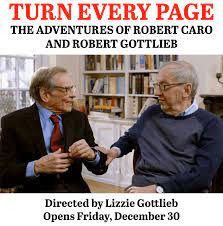“Turn Every Page”: Robert Caro vs. Robert Gottlieb

The film opens with a soundmany people today have never heard. But I remember it well: the clacking oftypewriter keys. These keys are being struck, in rapid succession, by twofingers, one on each hand. After 87 years of life and the publication of two best-sellingbiographies (one in four volumes, with a fifth on its way), Robert Caro has notyet discovered either computerized word processing or touch-typing. Writing indepth about Robert Moses and Lyndon B. Johnson, Caro sticks to the old ways,including carbon-paper copies of all his drafts.
In his long, illustriouscareer, Caro has always worked with one editor: the now 92-year-old RobertGottlieb. He is by no means Gottlieb’s only prize author: Gottlieb has overseenthe publications of such luminaries as Toni Morrison, Joseph Heller, DorisLessing, and Bill Clinton. But his relationship with Robert Caro seems to be aspecial one, though it is not all smiles and pats on the back. As Gottliebexplains it, “He does the book work, I do the clean-up, and we fight.” Partlythey fight because Caro, an obsessive researcher who started out as a newspaperman, turns in drafts that are many thousands of words over their contractuallimit. That’s why Caro lugs his massive drafts into Gottlieb’s New York office,where together (always with a pair of #2 wooden pencils) they wrestle each bookinto submission.
This is what we see on screenin the new documentary, Turn Every Page, It was shot over five years byGottlieb’s filmmaker daughter, Lizzie Gottlieb. But despite her close proximityto her father and his most famous client, Lizzie did not get total access totheir working relationship. Yes, they are separately candid in answering herquestions (says Gottlieb admiringly about Caro’s accomplishments, “Anyone canbe adorable but not everyone can be industrious—with good results”). But the two men steadfastly refused ever tosit for an on-camera interview together. It was only near the end of thefilmmaking process that Lizzie was allowed to film them working—emphaticallychanging words and x-ing out rejected passages. In those scenes we’ll neverknow exactly what they were saying, because she was expressly forbidden torecord sound.
We do learn, though, a greatdeal about Caro’s research process. A strong believer in conveying the impactof place on a biographical subject’s life story, Caro long ago persuaded wifeIna to move with him to the impoverished Texas hill country, all the better tosoak up the atmosphere in which President Lyndon Johnson was raised. Thishelped particularly when he conducted a key interview with Johnson’s brother,Sam Houston Johnson. Though he had interviewed Sam Houston several times beforeabout his brother’s childhood, Caro distrusted the results. Aside from adrinking problem, Sam Houston had a reputation as a spinner of tall tales. But followinga religious conversion and a period ofsobriety, Sam Houston was persuaded by Caro to be interviewed inside the oldfamily home. Caro seated him at the well-worn Johnson dinner table, then stoodbehind him, frantically taking notes as the man—encouraged, surely, by theonce-familiar surroundings—began to reminisce. This, of course, is exactly whatCaro was hoping for. I’m only amazed that he trusted to his notetaking (and nota pocket tape recorder) to get it all down.
Caro told Lizzie that allthose carbon copies of his drafts were stored in a kitchen cupboard. Near theend of her film, he opens the cupboard door : thousands of sheets of paper arestuffed inside. Who knows what additional treasures they contain?
Beverly in Movieland
- Beverly Gray's profile
- 10 followers



